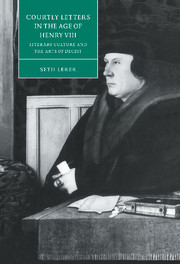Book contents
- Frontmatter
- Contents
- List of illustrations
- Acknowledgments
- Note on editions and abbreviations
- 1 Pretexts: Chaucer's Pandarus and the origins of courtly discourse
- 2 The King's Pandars: performing courtiership in the 1510s
- 3 The King's hand: body politics in the letters of Henry VIII
- 4 Private quotations, public memories: Troilus and Criseyde and the politics of the manuscript anthology
- 5 Wyatt, Chaucer, Tottel: the verse epistle and the subjects of the courtly lyric
- Notes
- Index
- Cambridge Studies in Renaissance Literature and Culture
4 - Private quotations, public memories: Troilus and Criseyde and the politics of the manuscript anthology
Published online by Cambridge University Press: 17 November 2009
- Frontmatter
- Contents
- List of illustrations
- Acknowledgments
- Note on editions and abbreviations
- 1 Pretexts: Chaucer's Pandarus and the origins of courtly discourse
- 2 The King's Pandars: performing courtiership in the 1510s
- 3 The King's hand: body politics in the letters of Henry VIII
- 4 Private quotations, public memories: Troilus and Criseyde and the politics of the manuscript anthology
- 5 Wyatt, Chaucer, Tottel: the verse epistle and the subjects of the courtly lyric
- Notes
- Index
- Cambridge Studies in Renaissance Literature and Culture
Summary
And with that word he drow hym to the feere,
And took a light, and fond his contenaunce,
As for to looke upon an old romaunce.
(Troilus and Criseyde, 111.978–80)Just what was Pandarus looking upon? Readers of this passage, almost from its earliest circulation, have been puzzled by its ambiguities, not least the status of the “romance” Pandarus withdraws to see. Is he observing Troilus and Criseyde in bed, secreting himself in a corner of the room to witness this romance in progress? Or, is he removing himself from the action just to read: to look upon a book, perhaps, much like that other “romance” that he found Criseyde and her friends reading at the opening of Book II of the poem (“This romaunce is of Thebes that we rede,” 11.100)? Or, too, is it a situation far more complicated than either interpretation admits? A. C. Spearing has remarked on how the “contrast between love as really experienced and love as read about in books is underlined” in Chaucer's verbal ambiguities, and he finds in this episode the locus classicus of Pandarus's voyeurism. His presence at a moment of deep privacy; the motives of his “look”; the status of his own “contenaunce” – all come together to define Pandarus as voyeur, and to raise the specter of his own arousal at his observations. For Spearing, Pandarus “has gained and is still gaining a vicarious sexual pleasure from the encounter between his niece and her lover,” and he is not alone among modern interpreters of Chaucer's poem to find something of an anxious ambiguity in the go-between's actions the following morning.
- Type
- Chapter
- Information
- Courtly Letters in the Age of Henry VIIILiterary Culture and the Arts of Deceit, pp. 122 - 160Publisher: Cambridge University PressPrint publication year: 1997



